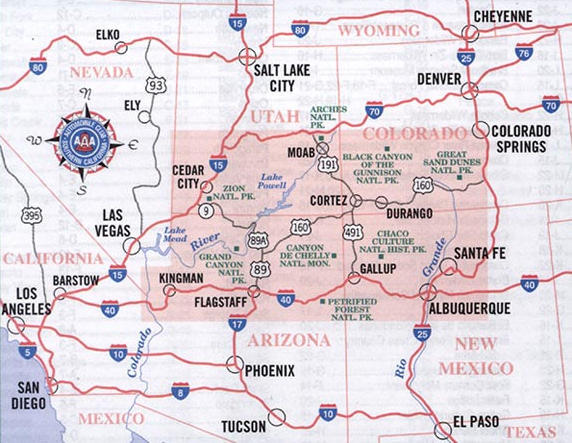What is Indian Country
Indian Country is the informal name for a region of the southwest U.S. that has many indigenous peoples' reservations. AAA and other companies sell Indian Country maps.

| Heart | 0 | Comment | 0 | Link |
The northern third of the AAA Indian Country map has many national parks, spectacular southwest scenery, and Pueblo Indian ruins. That region is immensely popular with tourists but it has few Indian reservations.
Most of the Indian reservation land is in the states of Arizona and New Mexico. 1/4 of Arizona is Indian reservations.

| Heart | 1 | Comment | 0 | Link |
The heart of Indian Country is south of the "Four Corners", the only place in the U.S. where 4 states meet. My planned route passes through the northern edge of Indian Country. Since I quit camping it's not possible to pedal through the Navajo and Hopi heartland farther south because there is no lodging.
Each tribe is sovereign and has its own rules. The universal rule is no trespassing and no camping. Services and campgrounds/lodging are rare. Sometimes the only option for a camping cyclist is to free camp behind a rare white-owned trading post.
I appreciate many aspects of the Indian reservations. The land is usually unspoiled, with few roads and little obvious development. The population is clustered in communities that are seldom visible from the highway. Consequently there are no farm or ranch houses in the countryside. Most reservations have no oil/gas development and no large scale logging or mining.
Some tribes are reclusive and want no interaction with outsiders. Other tribes are development-minded and eager to extract money from outsiders. The most common method to get money from outsiders is to open a casino. Indian tribes have a monopoly on casino gambling in the four Indian Country states.
Each tribe has its own government, court, police, health centers, and education system. The tribes are socialist and extremely community-minded. Native American culture is the exact opposite of European culture which celebrates individualism and natural resource exploitation. Cultural differences would cause enduring mutual mistrust even if there wasn't a long history of genocide, abuse, neglect, and broken treaties.
I've biked through Indian reservations on previous tours, including the reclusive Tohono O'odham reservation and the impoverished Pine Ridge reservation where white locals told me they're afraid to drive in a locked car. I never felt unsafe and was never hassled by drunks, cops, motorists, or anybody else. Like most places, visitors are safe if they behave in a respectful manner and don't openly flaunt the rules.
| Rate this entry's writing | Heart | 2 |
| Comment on this entry | Comment | 0 |
